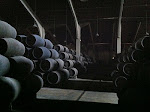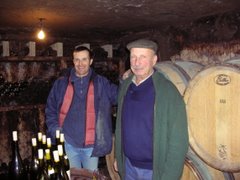Understanding Cornas, via St. Joseph
Recently I attended a small dinner organized by Michael Wheeler and Joe Salamone and Stephen Bitterolf of Crush. This dinner happened because those guys were able to find certain northern Rhône wines that are beloved to them, and they decided that they wanted to drink them together.
What are the northern Rhône wines that drive these guys to drink? Hermitage? Nope. Côte Rôtie? Nope. Well not on this night, anyway. It was Cornas, mostly, and one particular St. Joseph. We convened at Apiary, where Monday night's no corkage policy and the generally excellent food turn the dining room into a who's who in the NYC wine trade.
After drinking six top Cornas wines, after thinking and talking about them, I was very happy. But it was when the next wines hit the table that I had a little Cornas breakthrough. And the wines that hit the table were from St. Joseph. I'll explain that in a minute. Here are the wines we drank, first:
2006 Auguste Clape Cornas.
2001 Auguste Clape Renaissance.
2001 Thierry Allemand Cornas Chaillot.
2001 Thierry Allemand Cornas Reynard.
2000 Noël Verset Cornas.
1993 Noël Verset Cornas (magnum).
1992 Raymond Trollat St. Joseph (2 different bottles).
1985 Raymond Trollat St. Joseph.
These wines provoked lively discussion and the views that will appear here are solely those of the author and do not represent the views held by the network or any of its corporate sponsors. And I should mention that Verset and even more so Trollat's wines are impossible to find, and this was an incredibly generous thing to do, to share these rare wines.
The first thing I learned is that the 2006 Clape Cornas is not a wine that appeals to me, and I found little that identified it as Cornas. To me it felt more like a highly polished and very modern Syrah, and while there is certainly nothing wrong with that, and while in that context it was perfectly good wine, it isn't something that I would buy for myself. The 2001 Renaissance, though, was an interesting wine. It was well balanced and expressive, and there was an pleasing animale character underneath the black olives and dark fruit.
I had never before sat with Thierry Allemand's Chaillot and Reynard, and I relished the opportunity. It's funny - in drinking and comparing these 2001's, the Reynard was probably the better wine, but I took more pleasure in Chaillot. Reynard showed as a more complete wine. There was a pronounced menthol character on the nose that colored the fruit and soil, the wine had grit and substance, it was well extracted and also well balanced. The alcohol in the Chaillot stuck out a little and it felt a little herky-jerky at times, but there were things about this wine that excited me more than anything about Reynard excited me. I liked its comparatively elegant expression and sheer texture, the energetic brightness of the fruit, the almost delicate finish.
It's always a treat to drink the wines of Noël Verset. The 2000 was very good, although I must say that I have had better bottles of it. The magnum of 1993, however, was great. Balance, grace, depth, character - this wine seemed to have everything. Verset's wines do something for me that I've not found in any other wine. There are two distinct layers, if that's the right word. There is a top layer of fruit, perhaps some floral tones, and this is the pretty layer. Even with 17 years of age, when the fruit is not as fruity anymore, there is a prettiness to this aspect of the wine. Under that is a baked soil, earthy, far more rustic layer, and it doesn't act to compliment the top layer. It is almost at complete odds with the top layer, and this conflict is engrossing and weird, and somehow harmonious and lovely.
And then came Raymond Trollat's wines from St. Joseph, and all of the sudden I understood what Cornas is supposed to be. The Trollat wines were so very different from the Cornas wines that preceded them. They had none of the rustic edge, they came off as seamless, without edges. The 1992 was my favorite, with its beautiful floral aromatics and its gentle elegance.
It might sound like a very simple and basic thing, but for me it was a profound moment, drinking the Trollat wines after all that Cornas. I'm not saying that I think Cornas is better than St. Joseph or vice-versa. It was just one of those moments in which something that you hear as wine common knowledge is illuminated in a personal way. I've heard and read that Cornas is rustic. There is something rustic about Cornas wines, and when they're well made, it doesn't detract at all from the experience of drinking the wines. And maybe trying to compare a Cornas to St. Joseph is kind of silly - they are apples and oranges. But I had to drink great examples of each wine, together, at the same dinner, in order to understand this.







No comments:
Post a Comment